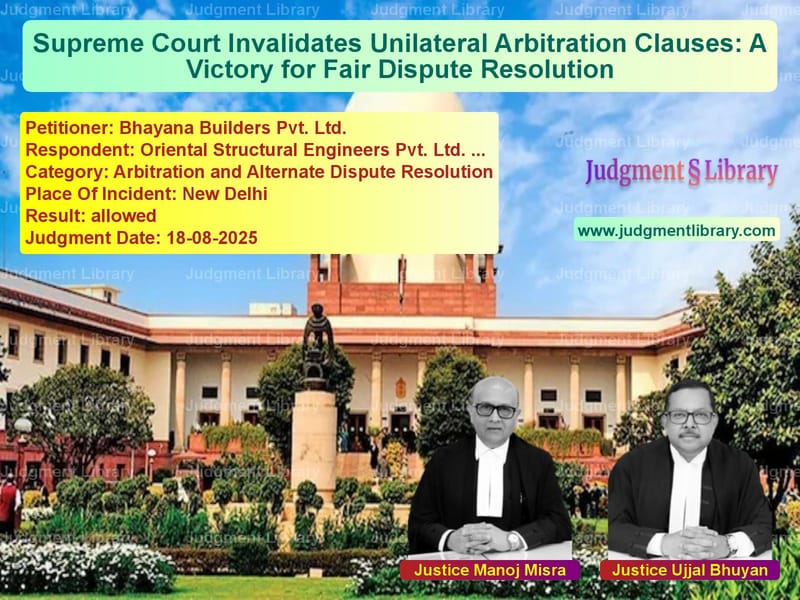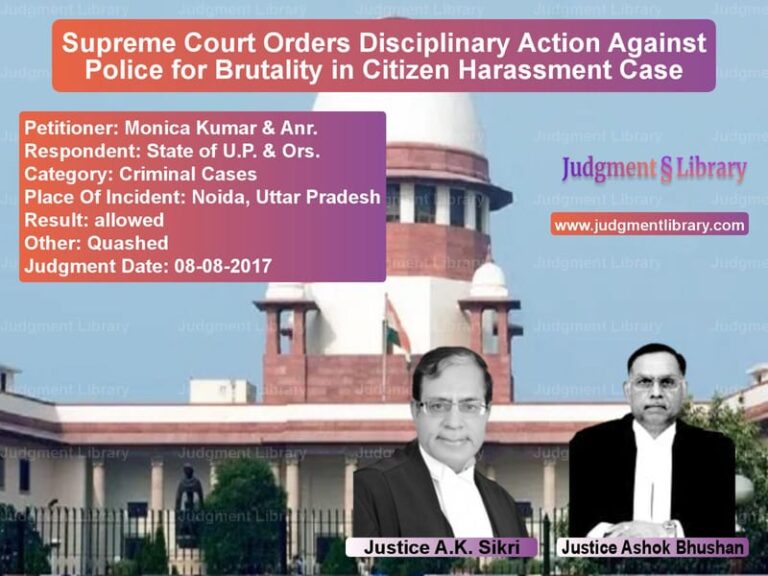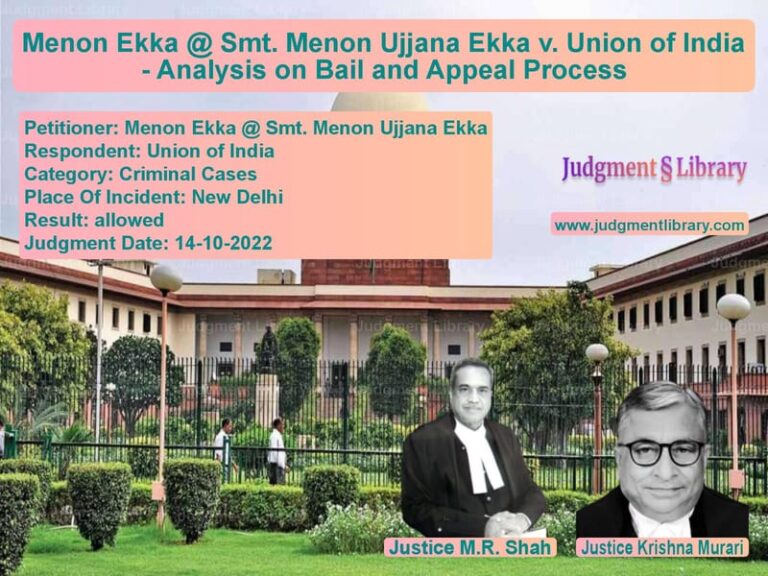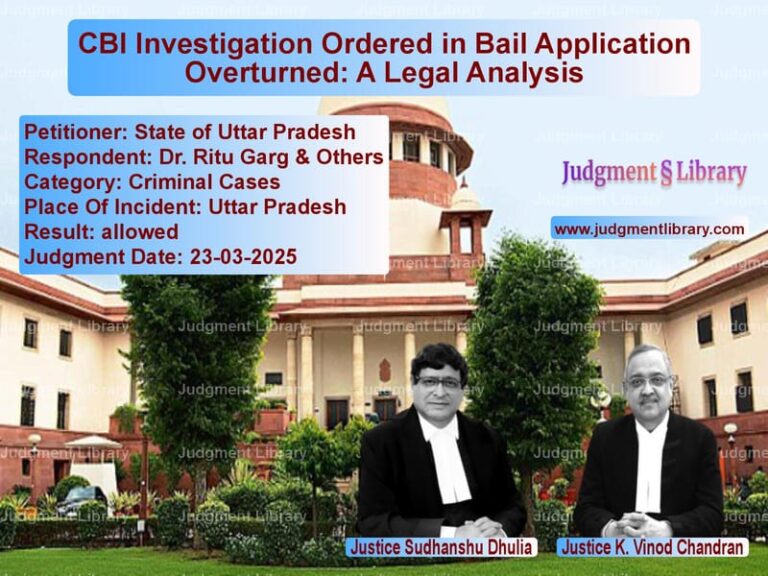Supreme Court Invalidates Unilateral Arbitration Clauses: A Victory for Fair Dispute Resolution
In a significant ruling that reinforces the principles of fairness and impartiality in dispute resolution, the Supreme Court of India has delivered a landmark judgment that fundamentally changes how arbitration clauses in contracts are interpreted and enforced. The case involved Bhayana Builders Pvt. Ltd. challenging a contractual provision that allowed one party to unilaterally appoint the sole arbitrator in case of disputes.
The legal battle began when Bhayana Builders found themselves in a dispute with Oriental Structural Engineers Pvt. Ltd. and other respondents. The subcontract agreement between the parties contained a crucial clause – 9.03, titled “Settlement of Disputes” – which stated that any disputes would be “finally resolved in accordance with the Arbitration and Conciliation Act, 1996 by Sole Arbitrator to be nominated (including nomination of replacement of Arbitrator, if necessitated by vacancy of the post caused by any reason whatsoever) by the Managing Director of the First Party, New Delhi.”
This clause essentially gave one party – through its Managing Director – the exclusive power to appoint the arbitrator who would decide disputes between the parties. Bhayana Builders, represented by their counsel, challenged this arrangement before the Delhi High Court, seeking termination of the mandate of the sole arbitrator appointed by the Managing Director of the respondents.
The appellant’s counsel made a compelling argument based on evolving legal precedent. “The learned counsel for the appellant submits that now there is a Constitution Bench decision of this Court in Central Organization for Railway Electrification (for short ‘CORE’) vs. ECI SPIC SMO MCML (JV) A Joint Venture Company, which has affirmed the law laid down in TRF (supra) and Perkins Eastman Architects DPC vs. HSCC (India) Ltd., declaring that a clause which allows one party to unilaterally appoint a sole arbitrator gives rise to justifiable doubts as to the independence and impartiality of the arbitrator.”
This argument highlighted a fundamental shift in how Indian courts view arbitration agreements. The counsel further emphasized that “such a unilateral clause is exclusive and hinders equal participation of the other party in appointment process of arbitrators.” This pointed to the core issue – that when one party controls the appointment of the decision-maker, the very foundation of impartial dispute resolution is compromised.
Facing these well-established legal principles, “The learned counsel for the respondents could not dispute that the instant case is squarely covered by Constitution Bench decision of this Court in ‘CORE (supra).'” This admission was significant because it acknowledged that the legal landscape had fundamentally changed, making unilateral appointment clauses unsustainable.
The Supreme Court, in its judgment delivered by Justice Manoj Misra with Justice Ujjal Bhuyan concurring, provided a clear and principled reasoning that builds upon established jurisprudence. The court noted that “In TRF (supra), this Court had held that if a person cannot be appointed an arbitrator being ineligible by operation of law, he cannot nominate another as a sole arbitrator.”
This principle, known as the “ineligible to nominate” doctrine, forms the cornerstone of the court’s reasoning. The judgment explained that “The Constitution Bench has upheld the view taken in TRF (supra). In such circumstances, since managing director of a company would be ineligible for being appointed as an arbitrator in view of Section 12 (5) read with paragraph 5 in the Fifth Schedule to the 1996 Act, he would be ineligible to nominate a sole arbitrator.”
The court’s reference to Section 12(5) of the Arbitration and Conciliation Act, 1996, is particularly significant. This provision, read with the Fifth Schedule, outlines circumstances that give rise to justifiable doubts about an arbitrator’s independence or impartiality. When a person falls under these categories, they become ineligible to act as an arbitrator. The Supreme Court extended this principle to hold that if someone is themselves ineligible to serve as arbitrator, they cannot exercise the power to appoint someone else to that position.
The practical implication of this reasoning is profound. In commercial contracts, it’s common for one party, typically the more powerful entity, to include clauses that give them the right to appoint arbitrators. The Supreme Court’s judgment effectively invalidates such clauses, ensuring that neither party has undue influence over the composition of the arbitral tribunal.
The court’s decision in “TRF Ltd. vs. Energo Engg. Projects Ltd.” marked the beginning of this jurisprudential evolution. In that case, the court established that if a person is interested in the outcome of the dispute or has some relationship with one of the parties that might affect their impartiality, they cannot appoint an arbitrator. The Constitution Bench in the CORE case later affirmed this principle, giving it the highest judicial endorsement.
In the Perkins Eastman case, the court further developed this reasoning, specifically addressing situations where a person associated with a party to the dispute is given the power to unilaterally appoint an arbitrator. The court recognized that such arrangements inherently create doubts about the arbitrator’s independence, as the appointee might feel obligated to the person who appointed them.
The Supreme Court’s judgment in the Bhayana Builders case represents the logical culmination of this legal evolution. By terminating the mandate of the sole arbitrator nominated by the Managing Director and referring the matter to the Delhi International Arbitration Centre for appointing a suitable arbitrator, the court has ensured that the arbitration process begins on a foundation of neutrality and impartiality.
This decision has far-reaching implications for commercial contracts across India. Many standard form contracts, particularly in construction, infrastructure, and corporate sectors, contain similar unilateral arbitration clauses. Following this judgment, such clauses are effectively unenforceable, and parties will need to revise their contract templates to provide for more balanced arbitrator appointment mechanisms.
The court’s approach reflects a broader global trend toward ensuring fairness in arbitration proceedings. International arbitration institutions and model laws increasingly emphasize the importance of impartial tribunals. By aligning Indian arbitration law with these international best practices, the Supreme Court has strengthened India’s position as an arbitration-friendly jurisdiction while maintaining essential safeguards for fairness.
For businesses and legal practitioners, this judgment serves as an important reminder to review existing contracts and ensure that dispute resolution clauses comply with the evolving legal standards. Parties should consider adopting institutional arbitration rules that provide for appointment by neutral institutions rather than unilateral party appointment.
The Supreme Court’s decision ultimately strikes a balance between promoting arbitration as an efficient dispute resolution mechanism and ensuring that it remains fundamentally fair. By invalidating unilateral appointment clauses, the court has protected the integrity of the arbitral process while encouraging parties to adopt more balanced approaches to arbitrator selection.
This judgment represents a significant step forward in India’s arbitration jurisprudence, reinforcing the principle that justice must not only be done but must be seen to be done. By ensuring that arbitrators are appointed through neutral mechanisms rather than unilateral party control, the Supreme Court has strengthened confidence in arbitration as a fair and effective means of resolving commercial disputes.
Petitioner Name: Bhayana Builders Pvt. Ltd..Respondent Name: Oriental Structural Engineers Pvt. Ltd. & Etc..Judgment By: Justice Manoj Misra, Justice Ujjal Bhuyan.Place Of Incident: New Delhi.Judgment Date: 18-08-2025.Result: allowed.
Don’t miss out on the full details! Download the complete judgment in PDF format below and gain valuable insights instantly!
Download Judgment: bhayana-builders-pvt-vs-oriental-structural-supreme-court-of-india-judgment-dated-18-08-2025.pdf
Directly Download Judgment: Directly download this Judgment
See all petitions in Arbitration Awards
See all petitions in Commercial Arbitration
See all petitions in Arbitration Act
See all petitions in Dispute Resolution Mechanisms
See all petitions in Enforcement of Awards
See all petitions in Judgment by Manoj Misra
See all petitions in Judgment by Ujjal Bhuyan
See all petitions in allowed
See all petitions in supreme court of India judgments August 2025
See all petitions in 2025 judgments
See all posts in Arbitration and Alternate Dispute Resolution Category
See all allowed petitions in Arbitration and Alternate Dispute Resolution Category
See all Dismissed petitions in Arbitration and Alternate Dispute Resolution Category
See all partially allowed petitions in Arbitration and Alternate Dispute Resolution Category







